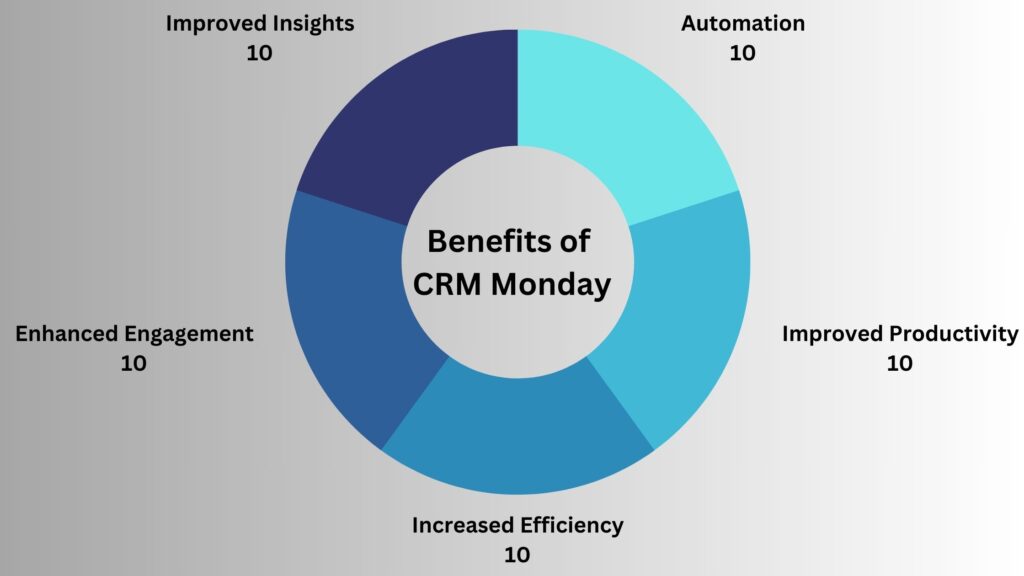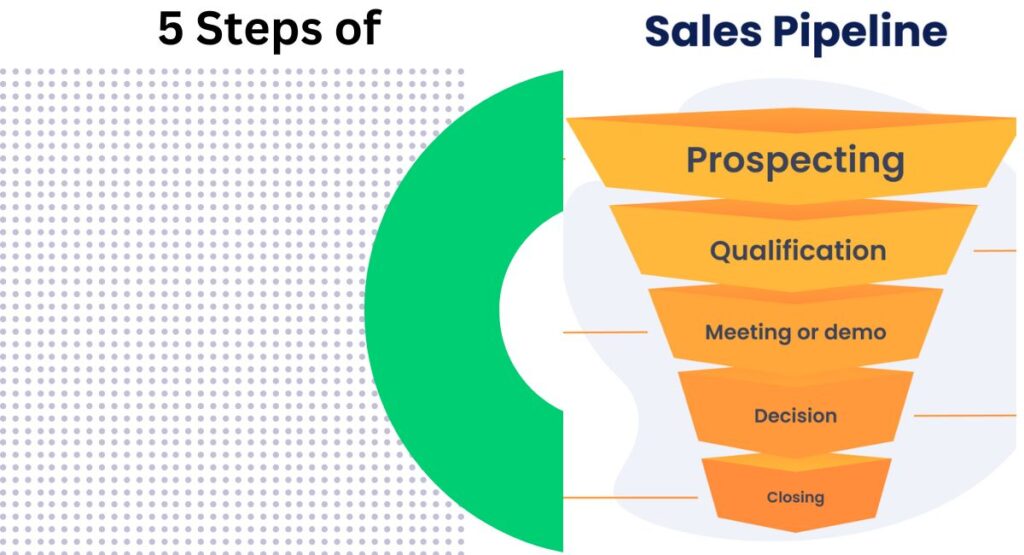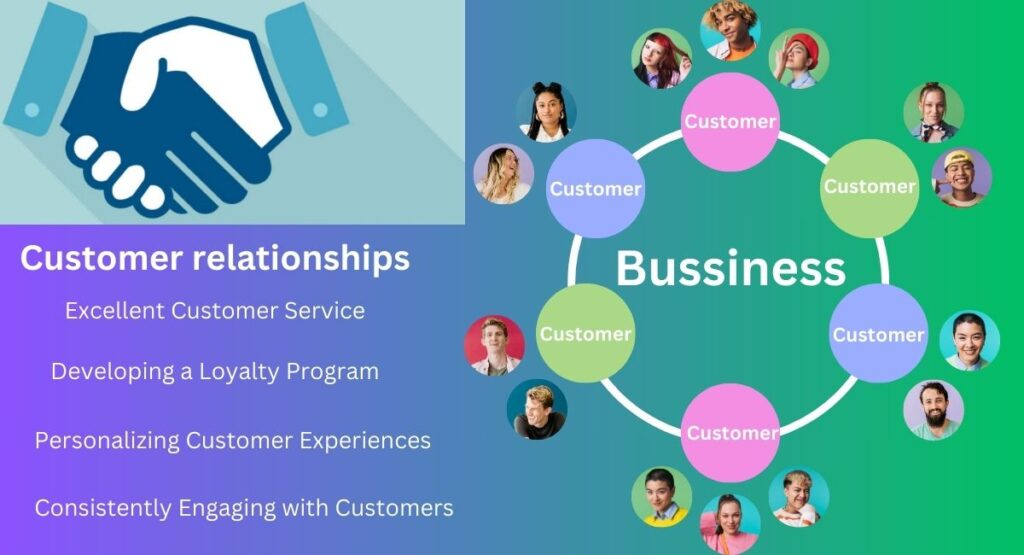Table of Contents
What is a CRM Monday?
CRM Monday is a real time automation tool use for customer relationship management (CRM) and its impact on businesses. This impact of strong customer relationships in achieving success. It also serves as an opportunity for organizations to think about the strategies they use when engaging with their customers, as well as how they can improve their customer relationships. Additionally, CRM Monday serves as a time for businesses to recognize the efforts of their employees who help foster strong customer relationships every day.

CRM Monday is a great way for businesses to take advantage with automation features of the power of customer relationship management (CRM) and its ability to foster strong relationships with customers. By leveraging automation, user-friendly interface, improved productivity, increased efficiency, enhanced engagement, and improved insights, businesses can create positive customer experiences with additional features that result in greater loyalty and satisfaction.
Benefits of Using a CRM Monday
A customer relationship management (CRM) Monday can help any business build strong relationships with customers, maintain a consistent communication and provide better customer service. Here are some of the key benefits of using a CRM Monday:

- Automation: A CRM Monday automates repetitive tasks, such as automatically sending out follow-up emails or scheduling meetings, so that your team can focus on more important tasks.
- Improved Productivity: Automation helps to reduce the amount of time spent on manual tasks, freeing up time for more strategic activities like customer outreach and relationship-building initiatives for business owners.
- Increased Efficiency: With a CRM Monday, businesses can streamline their sales process by quickly collecting customer information, tracking relationships, and managing leads for sales stages in one centralized place.
- Enhanced Engagement: A CRM Monday helps businesses create more meaningful customer relationships management team through custom dashboards personalized messages sent at the right time and for the right reasons through enterprise plan. This can help increase customer engagement, loyalty, and satisfaction with new presentation tools, collaboration tools, marketing campaign management and pipeline management.
- Improved Insights: Through analytics and reporting capabilities, a CRM Monday can provide valuable insights into customer behavior and preferences through team collaboration and use project management tools that can be used to tailor sales and marketing strategies to better meet customer needs.
Sales Pipeline
Sales pipeline is an important part of the CRM process, as it helps track and manage customer relationships throughout the sales cycle. It allows businesses to monitor and analyze leads, prospects and customers in order to improve customer experience and increase sales activities. With a sales pipeline, companies can also identify potential opportunities, forecast future revenue, allocate resources efficiently and make better decisions about how to use their marketing budget.

How to Set Up a Sales Pipeline
Setting up a sales pipeline is a key part of any successful business. A sales pipeline is essentially a visual representation of the process your customer prospects go through, from initial contact to conversion. It helps you manage potential customers and identify trends in their buying behavior so you can make informed decisions about your marketing strategies. Our team is available to setup sales pipeline. Here’s how to set up an effective sales pipeline:
1. Identify your customer segments: Define the different customer segments you want to target and ensure that your sales process is tailored to each one.
2. Establish a timeline: Create a timeline with milestones for each stage of the pipeline so that you can track progress and measure success with time tracking.
3. Identify key metrics: Determine which metrics are important for measuring success, such as customer acquisition cost or customer lifetime value.
4. Assign resources: Designate staff members to each stage of the pipeline and ensure that they have the tools and resources necessary to succeed.
5. Monitor performance: Track progress throughout the pipeline and use key metrics to adjust your strategies as needed.
Automating Your Sales Pipeline
Automating your sales pipeline is a great way to streamline the process of generating leads, nurturing relationships with prospects, contact details and closing deals. Automation can help you save time by automating routine tasks such as email follow-ups and scheduling appointments. It can also provide visibility into the entire sales process, allowing you to track progress and identify areas for improvement.
Using automation tools like CRM Mondays to automate your sales pipeline can help you increase efficiency, improve customer engagement, sales forecasting, business process, pricing plans, entire sales pipeline, sales reports, annual plan and generate more revenue.
Leveraging Sales Pipeline Insights
Sales pipeline insights are essential for businesses to understand their customers’ needs and grow actual revenue. With the right data, companies can gain valuable insights into customer behavior, identify opportunities for upselling and cross-selling, and generate more qualified leads. Leveraging sales pipeline insights is key to helping businesses stay ahead of the competition and maximize profits.
Sales pipelines provide companies with an overview of all deals from start to finish. By tracking progress at each stage of the pipeline, companies can gain insights into customer behavior and identify areas for improvement. This information can then be used to adjust sales strategies, optimize marketing campaigns, project progress, annual billing and measure success. With the right data, businesses can increase revenue by focusing their efforts on customers who are most likely to convert.
Assessing Performance in the Sales Pipeline
When it comes to assessing performance in the sales pipeline, there are a few key metrics that you should track. These include the number of leads generated, conversion rate, custom pipelines, basic features, average deal size, and close rate. By tracking each of these metrics on a regular basis, you can gain valuable insights into how your team is performing and where improvements could be made.
- Lead Generation: This metric tells you how many leads are email address being generated on a regular basis.
- Conversion Rate: This metric measures the percentage of leads that eventually convert into sales.
- Average Deal Size: This metric indicates the average value of each sale for entire sales cycle.
- Close Rate: Sales rep tells you the percentage of opportunities that turn into closed deals.
- Track and analyze key performance metrics: Tracking key performance metrics can provide valuable insights into how your sales pipeline is performing and where improvements need to be made. By tracking the number of leads generated, conversion rate, average deal size, and close rate on a regular basis, you can gain a better understanding of what’s working and what isn’t.
- Automate routine tasks: Automating routine tasks such as email follow-ups and scheduling appointments can help you save time and streamline the sales process. Using automation tools like CRM Mondays to automate your sales pipeline can help you increase efficiency, improve customer engagement, and generate more revenue.
- Leverage sales pipeline insights: Leveraging sales pipeline insights is essential for businesses to understand their customers’ needs and grow revenue. With the right data, companies can gain valuable insights into customer behavior, identify opportunities for upselling and cross-selling, and generate more qualified leads.
- Assign resources: Designate staff members to each stage of the pipeline and ensure that they have the tools and resources necessary to succeed in their roles. Properly assigning resources helps ensure that each stage of the process runs smoothly and efficiently.
- Monitor performance: Track progress throughout the pipeline on a regular basis using key performance metrics to adjust strategies as needed. This will allow you to identify areas where improvement is needed so that you can focus on areas with higher ROI potential going forward.
Customer Relationships
Customer relationships are one of the most important aspects of any business, large or small. It’s essential to establish a strong connection with customers in order to ensure their loyalty and satisfaction. A good customer relationship management (CRM) strategy is necessary for businesses to build trust and loyalty among their customers.
Some of the best ways to forge strong customer relationships include: providing excellent customer service, developing a loyalty program, personalizing customer experiences, and consistently engaging with customers. With the right CRM strategy, businesses can foster strong relationships with their customers that will lead to long-term success.

Improving Communication with Customers
Improving communication between a business and its customers is essential for success. In order to do so, businesses need to understand the needs of their customers, develop strategies to meet those needs, and build relationships with customers through regular interaction. Here are some tips for improving customer communication:
1. Understand customer needs. Take time to examine customer feedback, analyze how customers use your services or products, and consider their overall experience. Doing this will help you better understand your customers’ needs so that you can tailor communication to provide the best experience.
2. Establish customer service channels. Set up a variety of customer service channels such as phone, email, social media, and live chat so that customers can contact your business in the manner most convenient for them.
Automating Customer Relationship Tasks
Automating customer relationship tasks is an important part of any successful CRM system. Automation can help business decisions streamline sales, service, and marketing processes with custom criteria to ensure that customers receive timely, accurate information and have a positive experience with your company. Automation can also help streamline processes such as activity tracking, applicant tracking, lead scoring, up-selling and cross-selling opportunities, personalized communication strategies, and customer segmentation.
Analyzing and Optimizing Relationships
Analyzing and optimizing relationships is an important component of any successful customer relationship management (CRM) strategy. By taking a closer look at the relationships between customers and businesses, organizations can identify opportunities to improve customer experiences and maximize long-term loyalty.
Businesses need to start by analyzing customer data in order to gain a better understanding of their relationships with customers. This information can include purchase history , website activity, and customer service ratings. Once this data has been collected, businesses can use it to optimize their customer relationships by identifying areas where improvements need to be made.
Sales Team
The sales team is the engine that drives a company’s success. Without a strong and effective sales team, companies wouldn’t be able to meet their goals and grow. A successful sales team is made up of people who are motivated, knowledgeable, creative, and driven to decision maker to choice for businesses.
Setting Goals for Your Team Members
Setting goals for your team members can be a powerful way to increase engagement and productivity in the workplace. Goals give team members something to strive for, and having clear objectives can help people stay focused and motivated. By setting achievable goals, you give your team a sense of purpose and direction, allowing them to perform better.
When setting goals, it is important to think about what is best for the team as a whole. Make sure to set goals that are SMART (Specific, Measurable, Attainable, Relevant, and Time-bound), create realistic deadlines for each goal, and provide team members with the necessary resources to achieve their objectives.
Tracking Team Performance & Productivity
The success of any business is tied to the performance and productivity of their team, which is why tracking team performance and productivity is paramount. By implementing a CRM system that allows for performance tracking, businesses can gain valuable insights into how their teams are working, where they may need additional support, and what areas need improvement.
Conclusion:
CRM Monday is an opportunity for businesses to learn about new CRM trends, share ideas, and network with their peers. The event also provides a platform for vendors to showcase their products and services. This year’s CRM Monday was particularly successful, with plenty of new insights and ideas shared by experts from around the world.




Hellow,Admin, Great article, well done!
🌌 Wow, this blog is like a fantastic adventure launching into the galaxy of excitement! 🌌 The mind-blowing content here is a rollercoaster ride for the mind, sparking awe at every turn. 💫 Whether it’s inspiration, this blog is a goldmine of exciting insights! #MindBlown Embark into this exciting adventure of knowledge and let your imagination soar! 🚀 Don’t just enjoy, experience the excitement! #FuelForThought Your mind will thank you for this exciting journey through the worlds of awe! 🌍
Discover the Ultimate Adult Comic Experience at Erotoons.net! Our platform is dedicated to bringing you the finest selection of adult comics from around the globe. Each comic is a unique blend of captivating storylines and exquisite art, designed to enthral and entertain an adult audience. With our constantly updated collection, you’ll always find something that resonates with your tastes. Step into the world of Erotoons.net and transform your ordinary evenings into extraordinary adventures.
For those who crave a blend of art and allure, our timmy turner porn comics are a perfect choice. Discover a world of imagination at Erotoons.net.
Embark on an odyssey at Erotoons.net, where each comic is a vessel navigating the uncharted waters of erotic genres. Our vast collection is an archipelago of desire, each island a unique genre waiting to be explored by adult men with a taste for adventure. From the mystic shores of fantasy to the vibrant jungles of modern narratives, our comics are more than stories; they’re a voyage across the sea of sensuality. Set sail with us and chart your course through the most captivating realms of adult comics.
For those with a taste for the sophisticated and sensual, our raven straight shota porn comic at Erotoons.net offer an unparalleled experience.
Sweet blog! I found it while browsing on Yahoo News. Do you have any tips on how to get listed in Yahoo News? I’ve been trying for a while but I never seem to get there! Appreciate it
Step into a new era of shoe shopping with Zesc Analytics – where every click leads you closer to the perfect pair at the perfect price. Imagine a place where your footwear fantasies meet reality, without the fear of overspending. Zesc Analytics is not just a platform; it’s your personal shoe consultant, guiding you through seas of sales and oceans of options. Revel in the joy of informed buying, where every choice is backed by data and every purchase is a victory. Welcome to the future of footwear shopping.
Analytics.zesc.pro – sale on discounted shoes
Hey There. I found your blog the use of msn. This is an extremely neatly written article. I抣l make sure to bookmark it and return to read more of your helpful information. Thank you for the post. I will definitely return.
Power, business, relationships: system and structure
The best site about Power business relationship
Unlock the full potential of your shoe-shopping experience with Zesc Analytics! Our user-friendly platform offers unparalleled insights into shoe pricing, helping you make the most informed decisions. Whether you’re hunting for the latest trends or seeking the best value, Zesc Analytics guides you to your perfect pair with precision. Say goodbye to missed opportunities and hello to your dream shoes at dream prices. Dive into a world where style meets savings – explore Zesc Analytics now for a smarter, more rewarding shopping journey!
Analytics.zesc.pro – discounted shoe options
Hi, i think that i saw you visited my weblog so i came to 搑eturn the favor?I am trying to find things to enhance my web site!I suppose its ok to use some of your ideas!!
A further issue is that video games are usually serious naturally with the most important focus on finding out rather than entertainment. Although, it comes with an entertainment factor to keep children engaged, just about every game will likely be designed to improve a specific skill set or program, such as instructional math or scientific disciplines. Thanks for your article.
Definitely, what a fantastic blog and enlightening posts, I surely will bookmark your blog.Have an awsome day!
Thanks for the distinct tips discussed on this web site. I have realized that many insurance agencies offer customers generous deals if they favor to insure several cars together. A significant number of households own several automobiles these days, particularly those with more mature teenage kids still dwelling at home, as well as savings with policies can soon mount up. So it pays off to look for a bargain.
I would love to add if you do not surely have an insurance policy or maybe you do not belong to any group insurance, you may well gain from seeking aid from a health broker. Self-employed or people having medical conditions usually seek the help of the health insurance specialist. Thanks for your writing.
Thanks for your posting. One other thing is that often individual states have their unique laws that will affect people, which makes it very difficult for the the legislature to come up with the latest set of rules concerning foreclosed on house owners. The problem is that each state has got own legal guidelines which may work in an unwanted manner on the subject of foreclosure insurance policies.
My coder is trying to convince me to move to .net from PHP. I have always disliked the idea because of the costs. But he’s tryiong none the less. I’ve been using WordPress on various websites for about a year and am nervous about switching to another platform. I have heard good things about blogengine.net. Is there a way I can transfer all my wordpress content into it? Any kind of help would be greatly appreciated!
It抯 in point of fact a great and helpful piece of information. I抦 satisfied that you simply shared this helpful information with us. Please keep us up to date like this. Thank you for sharing.
Hi there! I simply would like to give a huge thumbs up for the good info you have right here on this post. I will likely be coming back to your weblog for more soon.
I was curious if you ever thought of changing the structure of your blog? Its very well written; I love what youve got to say. But maybe you could a little more in the way of content so people could connect with it better. Youve got an awful lot of text for only having one or 2 images. Maybe you could space it out better?
I know this if off topic but I’m looking into starting my own weblog and was curious what all is required to get set up? I’m assuming having a blog like yours would cost a pretty penny? I’m not very internet savvy so I’m not 100 positive. Any recommendations or advice would be greatly appreciated. Cheers
Hello my friend! I wish to say that this article is amazing, great written and include approximately all significant infos. I抎 like to look extra posts like this .
I just couldn’t depart your website before suggesting that I actually loved the standard info an individual provide for your visitors? Is gonna be back incessantly to investigate cross-check new posts
There are some attention-grabbing closing dates on this article however I don抰 know if I see all of them heart to heart. There may be some validity but I will take hold opinion till I look into it further. Good article , thanks and we would like more! Added to FeedBurner as well
So picture this: you’re scrolling through your Instagram feed, double-tapping on photos of cute puppies and mouth-watering food, when suddenly – bam! – you realize you’ve been logged out of your own account. Talk about a buzzkill, right? But fear not, because there’s a hero in the digital world: assistance with hacked instagram account recovery ! This awesome website is like a superhero cape for your Instagram woes. Whether you’ve forgotten your password, got hacked, or just can’t seem to log in for some reason, instagram locked account solutions has got your back. With their easy-to-follow instructions and friendly support, you’ll be back to sharing your #OOTD and sunset pics in no time. So next time you find yourself locked out of your Insta, just remember – instagram troubleshooting for locked accounts to the rescue!
Facebook, the go-to social media platform for connecting with friends and family, can present challenges when it comes to account access. Luckily, support for hacked instagram account recovery offers a lifeline for users experiencing difficulties with their Facebook accounts. Whether it’s an account suspension, a forgotten password, or security concerns, best practices for recovering hacked instagram account provides expert assistance. Users can find valuable resources and guides on the website to help them navigate the process of account recovery. With clear instructions and helpful tips, support for hacked instagram account recovery empowers users to regain control of their Facebook profiles and resume their online interactions seamlessly.
I figured out more interesting things on this losing weight issue. Just one issue is a good nutrition is tremendously vital while dieting. An enormous reduction in fast foods, sugary foodstuff, fried foods, sugary foods, beef, and whitened flour products could possibly be necessary. Retaining wastes parasitic organisms, and toxins may prevent ambitions for shedding fat. While specified drugs quickly solve the challenge, the awful side effects are certainly not worth it, and so they never give more than a momentary solution. It can be a known incontrovertible fact that 95 of celebrity diets fail. Thanks for sharing your opinions on this blog site.
Excellent write-up
Many thanks for this article. I’d also like to convey that it can always be hard when you’re in school and just starting out to create a long history of credit. There are many pupils who are only trying to endure and have a lengthy or positive credit history can be a difficult issue to have.
Yesterday, while I was at work, my sister stole my iphone and tested to see if it can survive a 40 foot drop, just so she can be a youtube sensation. My apple ipad is now broken and she has 83 views. I know this is entirely off topic but I had to share it with someone!
My brother suggested I may like this website. He used to be totally right. This publish truly made my day. You can not consider just how so much time I had spent for this info! Thanks!
Thanks for sharing. I read many of your blog posts, cool, your blog is very good.
I抳e read a few excellent stuff here. Certainly price bookmarking for revisiting. I wonder how so much attempt you place to make this type of excellent informative website.
Thanks for sharing. I read many of your blog posts, cool, your blog is very good.
I don’t think the title of your article matches the content lol. Just kidding, mainly because I had some doubts after reading the article.